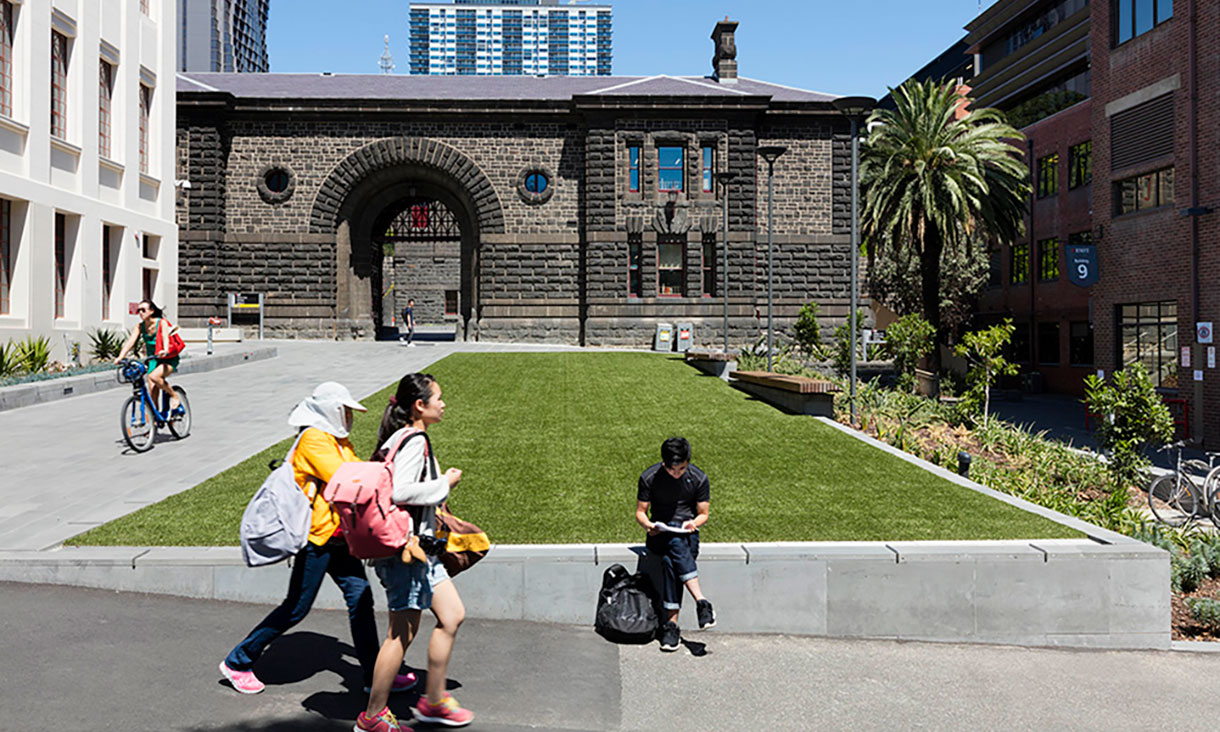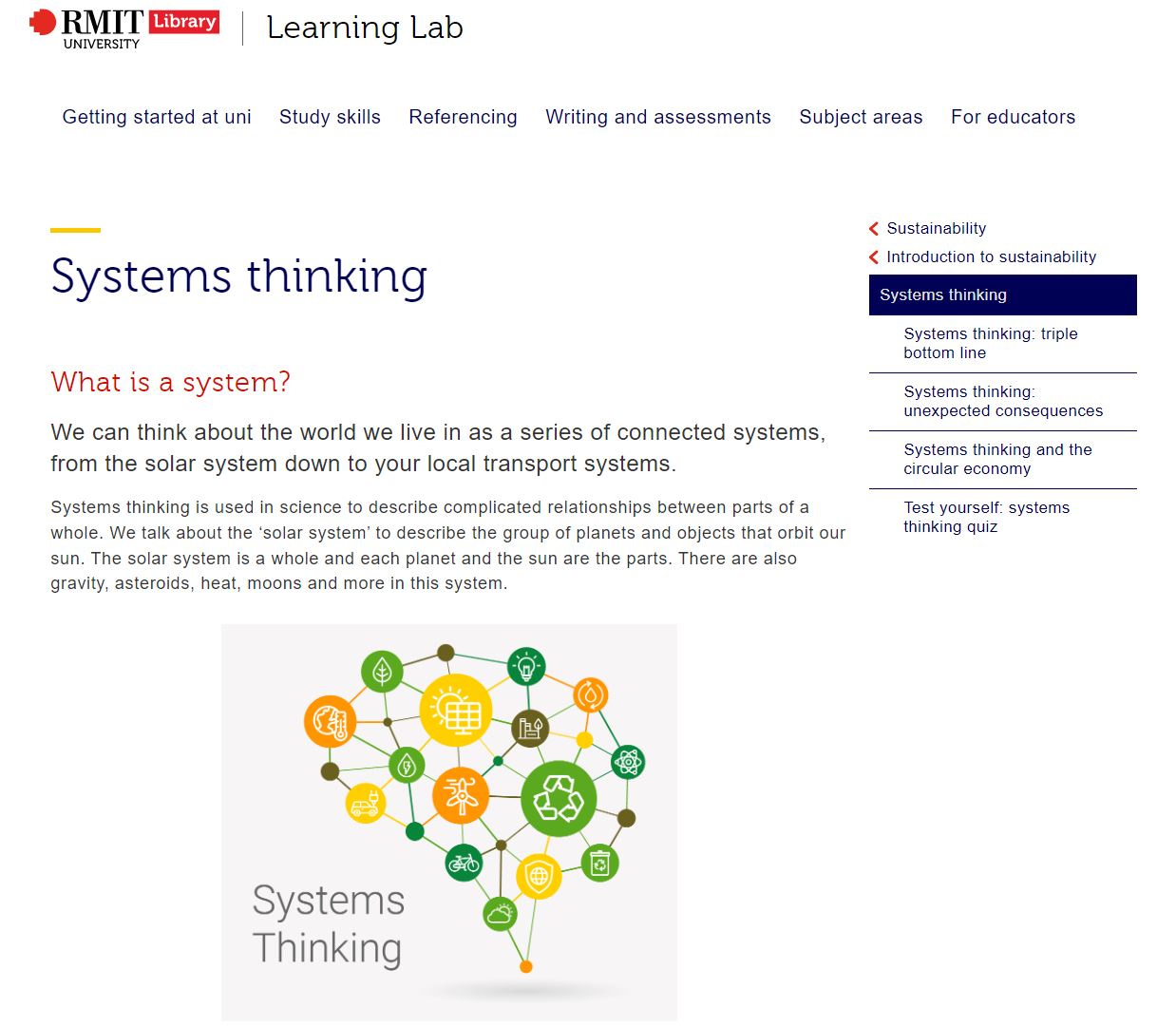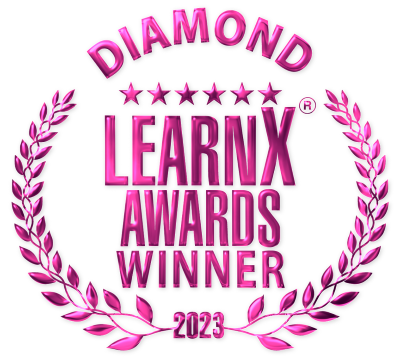
Bridging the gap with RMIT’s new sustainability resource for students
A new and exciting resource provides scaffolded learning materials enabling educators to embed sustainability education throughout the student learning journey.
Created by the RMIT Library, the learning materials consist of three sections - “United Nations Sustainable Development Goals (UN SDGs)”, “systems thinking” and “SDGs in your life”.
In creating the learning materials, the Library Digital Learning team focused on relevance and interactivity. Engaging activities like quizzes, create your own sustainable goals, and a creative practice reflective activity feature throughout.
The resource is housed on the Learning Lab making it accessible by RMIT students globally regardless of study area or location.
Commitment to sustainability reflected across RMIT
RMIT has a long-held commitment to advancing sustainability throughout many facets of its operation – from governance and operations, to learning and research.
In 2017 the University made a public commitment to support, promote and contribute to the UN SDGs and is currently ranked 7th globally in the 2023 Times Higher Education (THE) University SDGs Impact Ranking.
And in 2022, STEM College introduced a compulsory course in Sustainability for all students within the college studying across areas like science, technology, engineering and maths.
Within the Library’s new resource are real-world case studies of projects at RMIT that evidence the University’s work supporting the UN SDGs like the Litter Trackers project and Aquatic Pollution Prevention Partnership.
Teryn Atwell, Senior Learning Designer involved in the creation of the resource, explained that incorporating real-world examples helps students to understand the connection between sustainability and the world they live in.
“It’s really important for students to see the knowledge and principles taught in the Learning Lab in practice through these case studies,” she said.
 Screenshot of the sustainability resource on the Learning Lab
Screenshot of the sustainability resource on the Learning Lab
Further contextualisation
Embedded throughout the resource are links to further learnings which include micro-credentials and the new Learning Lab Contextualised Content (LLCC) on RMIT’s Open Press.
The Learning Lab Contextualised Content (LLCC) is a suite of online learning materials published on RMIT Open Press, the University's open textbooks platform.
The content on the Learning Lab and LLCC can be used independently or in conjunction with each other to broaden students’ practical knowledge of sustainability.
The learning materials on the LLCC aim to engage students through a contemporary fictional scenario that follows a group of characters organising a two-day community festival in a regional town in Victoria, named Salty Creek.
Throughout each situation detailed in the resource, students are taken on a compelling guided journey on how the characters are applying different sustainability concepts or skills to complete activities relating to the fictional festival.
Students are prompted to evaluate sustainability throughout the journey when considering how to organise the festival and communicate the importance of sustainability to festival-goers.
What inspired the resources?
RMIT is focused on ensuring that students graduate to become ethical global citizens, in which commitment to sustainability plays a big role. This is outlined in RMIT’s Education plan which mentions the engagement and contribution to UN SDGs as a part of fostering graduates who are ethical global citizens.
“There needs to be a strong focus on sustainability and UN SDG as they are relevant to growing industries and areas of innovation in Australia,” said Atwell.
With the widespread use of the term sustainability across various disciplines, it was important that the resource is accessible and uses universal language across all learning modules.
“It’s really important that we are using terms and frameworks that are common so that people have that common understanding, particularly when we are educating people about sustainability” explained Ivory.
Educators encouraged to use the resource to support learning
Both the Leaning Lab resources and LLCC are free for educators to use and can be adapted and shared by anyone if attributed and not sold.
The modules and pages can be utilised by educators in various ways. This includes links to relevant content on canvas pages or through interactive activities that can be embedded into coursework.
More information

The open educational resource Learning Lab Contextualised Content was awarded the Diamond Award for Best Free eLearning Resource at the 2023 that RMIT Library's Digital Learning Team has been recognised at the 2023 LearnX Awards.
The LearnX Awards are a yearly showcase of work by those who are leading the way in learning design, training, and talent management worldwide. Entries are merit based and are evaluated by judges, who recognise outstanding contribution to the industry and allocate bronze, silver, gold, diamond, and platinum awards for each category.


Acknowledgement of Country
RMIT University acknowledges the people of the Woi wurrung and Boon wurrung language groups of the eastern Kulin Nation on whose unceded lands we conduct the business of the University. RMIT University respectfully acknowledges their Ancestors and Elders, past and present. RMIT also acknowledges the Traditional Custodians and their Ancestors of the lands and waters across Australia where we conduct our business - Artwork 'Sentient' by Hollie Johnson, Gunaikurnai and Monero Ngarigo.
More information